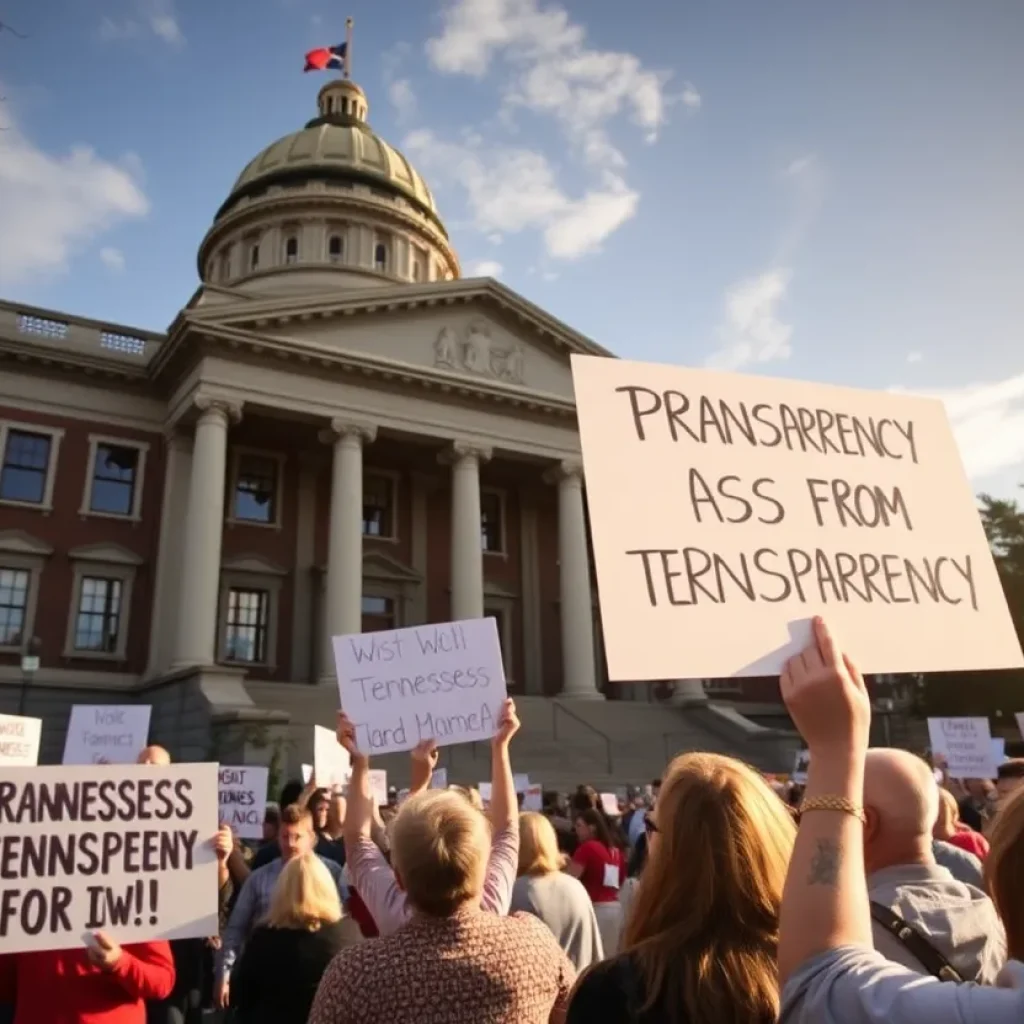News Summary
Tennessee senators are under fire following a $1.9 billion business tax break vote, with 13 declaring conflicts of interest. Key figures like Sen. Shane Reeves, connected to the benefits, raise concerns about transparency. Despite these issues, the Senate passed the tax cuts 25-6. Critics call for clearer disclosure on benefiting businesses, highlighting the need for integrity in the legislative process.
Tennessee Senators are facing increased scrutiny following a recent vote on a $1.9 billion business tax break. Out of the 33 senators, 13 declared conflicts of interest before casting their votes, raising concerns about transparency and fairness in legislative processes.
Among those senators is Republican Sen. Shane Reeves from Murfreesboro, who has direct business ties related to the tax benefits under discussion. Reeves previously received a $1 million FastTrack grant from the Tennessee Department of Economic and Community Development in 2016, which he utilized to establish TwelveStone Health Partners, a healthcare services company. This investment has proven fruitful, leading to the creation of nearly 300 new jobs and an investment of approximately $15 million into the local economy.
As a co-founder of TwelveStone, Reeves transitioned from his prior venture, Reeves-Sain Drugstore, which he sold for $66 million. In light of the recent tax law changes enacted in 2023, TwelveStone, along with its affiliates, is among 16,000 businesses projected to receive franchise tax refunds exceeding $10,000. Despite declaring a conflict of interest related to the vote, Reeves asserted that TwelveStone has adhered to all the requirements linked to the state grant. He does not perceive any issues concerning the possibility of double-dipping into state resources.
The political landscape surrounding this tax break is characterized by Tennessee’s Senate Rule 13, a policy that allows legislators to declare conflicts of interest without needing to provide specific details. Another senator, Democratic Sen. Jeff Yarbro, also declared a conflict prior to the vote due to his own professional connections. Yarbro opposed the tax cut, citing the need for greater scrutiny in the context of the significant funding involved.
Calls for increased transparency have been amplified by members of the House of Representatives, who pushed for more detailed disclosures regarding the tax refunds. However, the Senate chose to limit the depth of information shared about the businesses benefitting from the proposed tax breaks. Many critics, including public records advocates, argue that the current reporting criteria are inadequate, especially given the large sums received by major companies such as FedEx and Ford.
Despite the controversies surrounding conflicts of interest, the Senate proceeded with the legislation and voted with a significant majority of 25-6 in favor of the tax cuts. House Majority Leader William Lamberth characterized the reductions as sound policy, distancing the discussion from legal implications. Meanwhile, Republican Sen. Brent Taylor, although declaring a conflict, opted not to apply for any tax refunds to avoid even the perception of impropriety.
Complicating the matter further, discussions regarding the tax cut have been shadowed by potential legal challenges to Tennessee’s franchise tax, as warned by Attorney General Jonathan Skrmetti. In response, Yarbro and state Rep. John Ray Clemmons have proposed legislative changes to solidify the constitutionality of the franchise tax without necessitating rebates.
The ongoing scrutiny highlights a critical junction for Tennessee’s legislative process as public confidence in the state’s governance hangs in the balance. Legislators, particularly those benefitting from tax breaks or associated grants, may face increased pressure to address these concerns and ensure that their actions are transparent and aligned with the interests of their constituents.
In summary, the controversy surrounding the recent tax break vote underlines a pivotal discussion about legislative integrity, as multiple senators, including those with vested interests, navigate potential conflicts while seeking to balance business interests with public accountability.
Deeper Dive: News & Info About This Topic
- Tennessee Lookout: Conflicted Tennessee Senate Overwhelmingly Passed Business Tax Refund
- Bloomberg: Credit Card Swipe Fee Fight Complicates Stablecoin Bill Passage
- Newsweek: Senate Crypto Bill Advances Amid Trump Corruption Fears
- WSMV: State Lawmakers Take First Steps to Change How Bonding Monitoring Companies Operate
- Tennessean: Tennessee Franchise Tax Change Senators Disclose Conflicts
- Wikipedia: Taxation in the United States

Author: STAFF HERE MEMPHIS WRITER
The MEMPHIS STAFF WRITER represents the experienced team at HEREMemphis.com, your go-to source for actionable local news and information in Memphis, Shelby County, and beyond. Specializing in "news you can use," we cover essential topics like product reviews for personal and business needs, local business directories, politics, real estate trends, neighborhood insights, and state news affecting the area—with deep expertise drawn from years of dedicated reporting and strong community input, including local press releases and business updates. We deliver top reporting on high-value events such as Beale Street Music Festival, Elvis Week, and Memphis in May International Festival. Our coverage extends to key organizations like the Greater Memphis Chamber and the Memphis Convention & Visitors Bureau, plus leading businesses in logistics, healthcare, and music that power the local economy such as FedEx, St. Jude Children's Research Hospital, and AutoZone. As part of the broader HERE network, including HEREBristol.com, HEREChattanooga.com, HEREKnoxville.com, and HERENashville.com, we provide comprehensive, credible insights into Tennessee's dynamic landscape.







